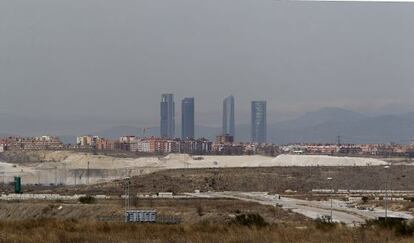Pollution is making Europe ill
90 percent of the continent's urban population is breathing harmful air Experts are calling on Brussels to toughen environmental legislation


It may be that Europe has better air quality than many of Asia or Latin America's major cities, but that doesn't mean Europeans are breathing clean, healthy air. The European Environment Agency (EEA) this week alerted that "around 90 percent of city dwellers in the European Union are exposed to one of the most damaging air pollutants at levels deemed harmful to health by the World Health Organization [WHO]."
The air quality assessment, which used official 2011 data provided by member states, finds that "despite falling emission levels and reductions of some air pollutant concentrations in recent decades [...] two specific pollutants, particulate matter and ground-level ozone, continue to be a source of breathing problems, cardiovascular disease and shortened lives."
The alert comes at a decisive moment. Only months ago, the WHO updated its 2005 guide to the negative effects of pollutants on health, and the conclusions are revealing: it is scientifically proven that the effects of low amounts of air pollution are much worse than previously thought. Now, it is up to the European Commission to review its own legislation in light of these findings.
Even at levels the EU considered safe, there were observable health effects"
Will Brussels pass more stringent laws, or will it simply tweak existing ones to little effect? The scientific community, which is not prone to lobbying, is nevertheless pressuring the European executive to get tougher on air pollution. Researchers are asking for it in their papers, and institutions such as the European Academy of Allergology and Clinical Immunology are flooding the Commission with data and recommendations for more effective legislation.
The results of ongoing research keep coming in: fine particulate matter has been linked to low infant weight at birth; a higher incidence of pediatric asthma has been found among children living near busy thoroughfares; cardiovascular and respiratory problems are on the rise...
"The scientific evidence is on the table, and Brussels should take it into account. As researchers, it is our obligation to say what we find," says Julio Díaz, a researcher at the Carlos III Health Institute in Madrid who has been analyzing the link between fine particulate matter (produced chiefly by diesel engines) and adverse health effects for over a decade. His work has proven a relationship between pollution and hospital admissions, death rates among people 75 and older, and death from circulatory and respiratory problems. "We found that even at levels that the EU considered safe, there were observable health effects," says Díaz.
The limits on exposure to air pollutants set by Brussels are a source of controversy. EU legislation is a lot more lax than the WHO or the US Environmental Protection Agency recommends. A clear example is PM2.5, or particulate matter that is 2.5 micrometers in diameter or less. Europe allows an annual average of 25 micrograms per cubic meter, while the WHO sets the level at 10.
The EU says pollution caused 400,000 premature deaths in 2010 in Europe
"We should be pursuing the WHO limits," says Xavier Querol, a researcher at the Spanish National Research Council (CSIC). "In many EEA and Commission reports these values are being used to see what percentage of the population is exposed to higher values than are considered harmful to one's health."
"The WHO focuses on health. The EU legislates on the basis of cost-effectiveness, and health competes with economic and social cost-benefit considerations," adds Jordi Sunyer, an epidemiologist at the Center for Environmental Epidemiology Research in Barcelona (CREAL).
The recent EEA report shows that between 2009 and 2011, up to 96 percent of city dwellers were exposed to concentrations of PM2.5 that were higher than WHO recommendations. In the case of ground-level ozone, this rate reached 98 percent. Europe's Environment Commissioner, Janez Potocnik, noted that pollution caused 400,000 premature deaths in 2010 in Europe. "That is 10 times the number of deaths from traffic accidents," he said. Potocnik's speech was titled: "If you think the economy is more important than the environment, try holding your breath while counting your money," and included figures on the real external costs of pollution: between 330 and 940 billion euros a year, a number that includes loss of work days, lower productivity and healthcare costs.
"The European Union's air quality policy must be based on the latest scientific evidence," said Potocnik in January, when he presented the WHO study.
That report, in which dozens of experts from all over the world participated, noted all the different lines of research associating exposure to various pollutants with harmful health effects such as respiratory disease, diabetes, cognitive difficulties, premature childbirth and more. The document specifically recommended "revising the limit value on fine particles," recalls Querol, one of the eight scientists who worked as advisors.
The Commission also believes it is necessary to review accepted levels of nitrogen dioxide (NO2), the toxic gas from car exhausts that is putting Madrid and Barcelona on the blacklist of cities that could face European sanctions. "Recent studies have linked exposure to NO2 with mortality, hospital admissions and respiratory symptoms at levels that were equal or lower than the current limits," said Commission members last January.
But the EEA suggests that no matter how much scientific evidence piles up, "the Commission also has to consider economic aspects and the opinion of the 28 member states." Even if Potocnik is willing to be stricter, he will have to make deals. The Commission has opened up consultations and has declared 2013 the Year of Air in order to raise public awareness about air quality. A recent Eurobarometer survey showed that nearly four out of five respondents thought the EU should propose additional measures to deal with pollution. It also showed the Spaniards were the least well informed Europeans with regard to air quality; they also ranked second in their belief that national authorities were doing nothing to combat air pollution.
Sunyer, the epidemiologist, notes that there is a yawning gap between what experts know and what the population believes. "To experts, air pollution is one of the most dangerous health hazards, and without a doubt the first among environmental hazards," he says.
But citizens do not see it this way. In Madrid, people seem to have gotten used to the smog cap hovering over the city. Also, because the effects of air pollution are invisible and only noticeable in the long run, people seem to dismiss them as less important than other factors. But Querol notes that "many European societies are more aware than ours about the need to improve air quality."
Tu suscripción se está usando en otro dispositivo
¿Quieres añadir otro usuario a tu suscripción?
Si continúas leyendo en este dispositivo, no se podrá leer en el otro.
FlechaTu suscripción se está usando en otro dispositivo y solo puedes acceder a EL PAÍS desde un dispositivo a la vez.
Si quieres compartir tu cuenta, cambia tu suscripción a la modalidad Premium, así podrás añadir otro usuario. Cada uno accederá con su propia cuenta de email, lo que os permitirá personalizar vuestra experiencia en EL PAÍS.
¿Tienes una suscripción de empresa? Accede aquí para contratar más cuentas.
En el caso de no saber quién está usando tu cuenta, te recomendamos cambiar tu contraseña aquí.
Si decides continuar compartiendo tu cuenta, este mensaje se mostrará en tu dispositivo y en el de la otra persona que está usando tu cuenta de forma indefinida, afectando a tu experiencia de lectura. Puedes consultar aquí los términos y condiciones de la suscripción digital.








































